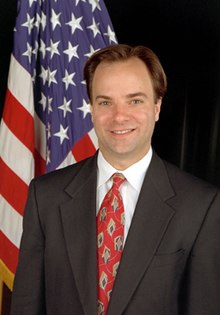This is an old revision of this page, as edited by MastCell (talk | contribs) at 17:53, 4 August 2006 (Added section on role in Plan B controversy). The present address (URL) is a permanent link to this revision, which may differ significantly from the current revision.
Revision as of 17:53, 4 August 2006 by MastCell (talk | contribs) (Added section on role in Plan B controversy)(diff) ← Previous revision | Latest revision (diff) | Newer revision → (diff)
Mark B. McClellan (born June 26, 1963) was sworn in as Administrator for the Centers for Medicare and Medicaid Services in the United States Department of Health and Human Services on March 25, 2004. In this position, he is responsible for administering the Medicare and Medicaid programs. Following the resignation of Health & Human Services Secretary Tommy Thompson in 2004, McClellan was mentioned as a possible replacement, but President Bush ultimately nominated former Utah governor Mike Leavitt. Dr. McClellan previously served as Commissioner for the Food and Drug Administration (FDA) beginning November 14, 2002. Originally from Austin, Texas, he is the brother of former White House Press Secretary Scott McClellan and the son of Texas comptroller Carole Keeton Strayhorn and attorney Barr McClellan.
Previously, Dr. McClellan was Associate Professor of Economics at Stanford University, Associate Professor of Medicine at Stanford Medical School, a practicing internist, and Director of the Program on Health Outcomes Research at Stanford University. He was also a Research Associate of the National Bureau of Economic Research and a Visiting Scholar at the American Enterprise Institute. Additionally, he was a Member of the National Cancer Policy Board of the National Academy of Sciences, Associate Editor of the Journal of Health Economics, and co-Principal Investigator of the Health and Retirement Study (HRS), a longitudinal study of the health and economic well-being of older Americans. From 1998-99, he was Deputy Assistant Secretary of the Treasury for Economic Policy, where he supervised economic analysis and policy development on a wide range of domestic policy issues.
During 2001 and 2002, Dr. McClellan served in the White House. He was a Member of the President's Council of Economic Advisers, where he advised on domestic economic issues. He also served during this time as a senior policy director for health care and related economic issues for the White House.
Dr. McClellan's research studies have addressed measuring and improving the quality of health care, the economic and policy factors influencing medical treatment decisions and health outcomes, estimating the effects of medical treatments, technological change in health care and its consequences for health and medical expenditures, and the relationship between health and economic well-being. He has twice received the Arrow Award for Outstanding Research in Health Economics. He earned his M.D. degree from the Harvard-MIT Division of Health Sciences and Technology in 1992 and his Ph.D. in economics from MIT in 1993. He also earned an M.P.A. from the Harvard University Kennedy School of Government in 1991. He completed his residency training in internal medicine at Brigham and Women's Hospital, and he is board-certified in Internal Medicine.
Role in Plan B controversy
See also: Emergency contraception § International availabilityDuring McClellan's tenure as Commissioner of the FDA, the makers of Plan B emergency contraception applied for over-the-counter status. The application for OTC status was supported by the American Medical Association, the American Academy of Family Physicians, the American Academy of Pediatrics, the American College of Obstetricians and Gynecologists, and other leading U.S. medical organizations. On December 16, 2003, an advisory committee to the FDA recommended that Plan B be made available over the counter.
However, in May 2004 the FDA rejected over-the-counter status for Plan B. Subsequently, Reuters reported that in a sworn statement in June 2006, Dr John Jenkins, director of the FDA's Office of New Drugs, stated under oath that he learned in early 2004 that then-FDA Commissioner Mark McClellan had decided against approval before the staff could complete their scientific analysis.
In a separate sworn deposition, Dr Florence Houn said she was also told in January by Deputy Commissioner Dr Janet Woodcock that Plan B needed to be rejected "to appease the administration's constituents" but that it could be approved later.
McClellan stated that he gave regular updates to the White House as a matter of course, but denied that he was told what to do by the Bush Administration with regard to Plan B. In a sworn statement in June 2006, McClellan stated that "...if I was being given any direction on how I should act on this application, I would have remembered that because that never happened."
In August 2006, the FDA announced it would reopen discussion on OTC status for Plan B. This announcement came 24 hours before Dr Andrew von Eschenbach, the Bush Administration's nominee for FDA Commissioner, came before the Senate for confirmation hearings.
Notes
- "Briefing Document (1.2.4 Plan B: Rx-to-OTC Switch)". FDA.gov: December 16, 2003. Accessed August 2, 2006.
- "Panel backs over-the-counter 'morning-after' pill". CNN.com: December 17, 2003. Accessed April 28, 2006.
- ^ "Plan B decision made before data review - FDA staff". Reuters.com: 4 August 2006. Accessed 4 August 2006.